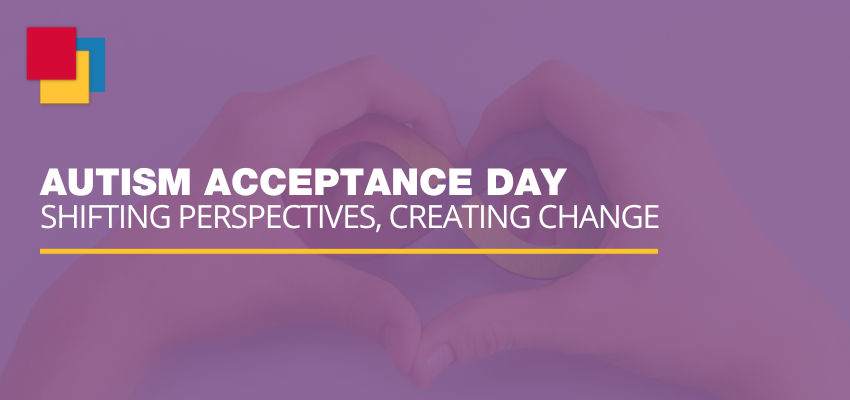Autism Acceptance Day 2025: Shifting Perspectives, Creating Change

Every year on April 2nd, Autism Acceptance Day serves as a powerful reminder of the importance of embracing and supporting autistic individuals. While awareness helps increase understanding, acceptance goes a step further—it challenges stereotypes, reduces stigma, and fosters inclusive environments where autistic people can thrive. This day is an opportunity to celebrate the unique perspectives, strengths, and contributions of autistic individuals while also advocating for meaningful change. Rather than viewing autism as something to be "fixed," we should celebrate the unique perspectives and strengths it brings.
At CSAHS, we are highlighting the impactful work of our researchers, scholars, and centers who are making meaningful contributions alongside autistic communities.
Let’s commit not just today, but every day, to understanding and valuing the experiences of autistic individuals and their contributions to our communities, workplaces, and beyond.
Autism Support at CSAHS: How Our Centers Are Making an Impact
Live Work Well Research Centre
The Live Work Well Research Centre’s Disabilities, Access and Inclusion Cluster, led by Deborah Stienstra, seeks to take an intersectional approach to disabilities studies to provide knowledge kits for inclusive practices with actionable tools and to inform social policy.
One of the Centre’s recent blogs, Navigating University with Autism Spectrum Disorder, discusses some of the challenges autistic students face when attending post-secondary school. This blog was part of Neurodiversity Celebration Week from March 17–23. Last year, the LWWRC posted Indigenous and Autistic: Nothing About Us Without Us, which discusses what autism “awareness” means from the perspective of an autistic Indigenous writer. A previous Autism Acceptance Day blog post describes the experiences of an LWWRC undergraduate research assistant (URA) working at a residential home for adolescents with autism and provides useful resources.
Below are are a few resources that The Live Work Well Research Centre has provided:
- The LWWRC created a recent blog post, 4 Apps for the Disabled Community, which highlights some applications that autistic people may find useful.
- Read the Centre’s news item about innovative Library programs that support autistic individuals by creating inclusive and welcoming spaces.
- Why do we say autistic people and not people with autism? Learn why many autistic people prefer Identity-First Language. To supplement this reading, check out the Centre’s blog post, Stop Calling Me Differently-abled, by Lorelei Root.
- Caregivers who could benefit from support networks can find support from family, fellow caregivers, or the Helpline at the Ontario Caregiver Organization.
- Sensory support kits and more can be helpful in comforting an autistic individual – learn more about Sensory Support Kits from Autism Canada.
- AIDE Canada’s online library provides free access to over 3000 resources on autism.
- The UK’s National Autistic Society offers advice and guidance about autism and the challenges autistic people and their families face.
- The Toronto-based site, Embrace Autism, provides knowledge on the different ways autism can present in individuals and gives access to questionnaires and assessment resources.
For more resources, please visit their news feed page on their website or connect with them on X.
The Re•Vision Centre for Art and Social Justice
Beyond the Normative Knot is a noteworthy initiative led by Re•Vision. The Centre for Art and Social Justice Postdoctoral Fellow Dr. Elizabeth Straus and involving CSAHS faculty member Dr. Carla Rice. Through interviews and digital storytelling, the project aims to challenge and transform stereotypes about the entanglements of gender, sexuality, and autism in health care, education, and communities, increase representation, and expand possibilities for living and thriving across diverse embodiments of gender, sexualities, and autistic ways of being.
The project is autistic-led and centers autistic and 2SLGBTQIA+ voices and knowledge co-production. The project also involves critical allies who are committed to shifting narratives and practices in affirming ways.
Be sure to stay connected with Re•Vision's social media accounts: Facebook, Instagram, Twitter, Bluesky, to stay updated on the project.
Maplewoods Centre
Maplewoods Centre for Family Therapy and Child Psychology provides a wide range of therapy services for clients of all ages on a sliding scale, including supporting those with neurodiversity such as ADHD and autism.
At Maplewoods, psychotherapy and psychological services are delivered by teams that include regulated health professionals and graduate students. Their clinicians are closely-supervised graduate students learning to practice their respective professions. Since they are a clinical training centre, you can be sure your therapist is immersed in the latest evidence-based approaches.
“At the Maplewoods Centre, our mission is promoting excellence, integration, and innovation in child psychology and family therapy practice. We work to improve the lives and relationships of children, youth, adults, and families by developing highly-skilled scientists and practitioners in the fields of family therapy, psychotherapy, and clinical child psychology.”
– Tamara Berman & Kevin VanDerZwet Stafford,
Co-Directors of the Maplewoods Centre
Research Spotlight
Olivia Dobson, BSc, MA, Ph.D. Student: Drawing Attention to Accessible Needle Procedures for Autistic Youth
Olivia Dobson is a PhD Candidate in the Department of Psychology’s Clinical Child and Adolescent Psychology (CCAP) program. Under the supervision of Dr. Meghan McMurtry in the Pediatric Pain Health and Communication (PPHC) Lab, Olivia’s research focuses on making needle procedure more comfortable for autistic youth and their caregivers.
Read Olivia's recent Looking Glass article: Drawing Attention to Accessible Needle Procedures for Autistic Youth.